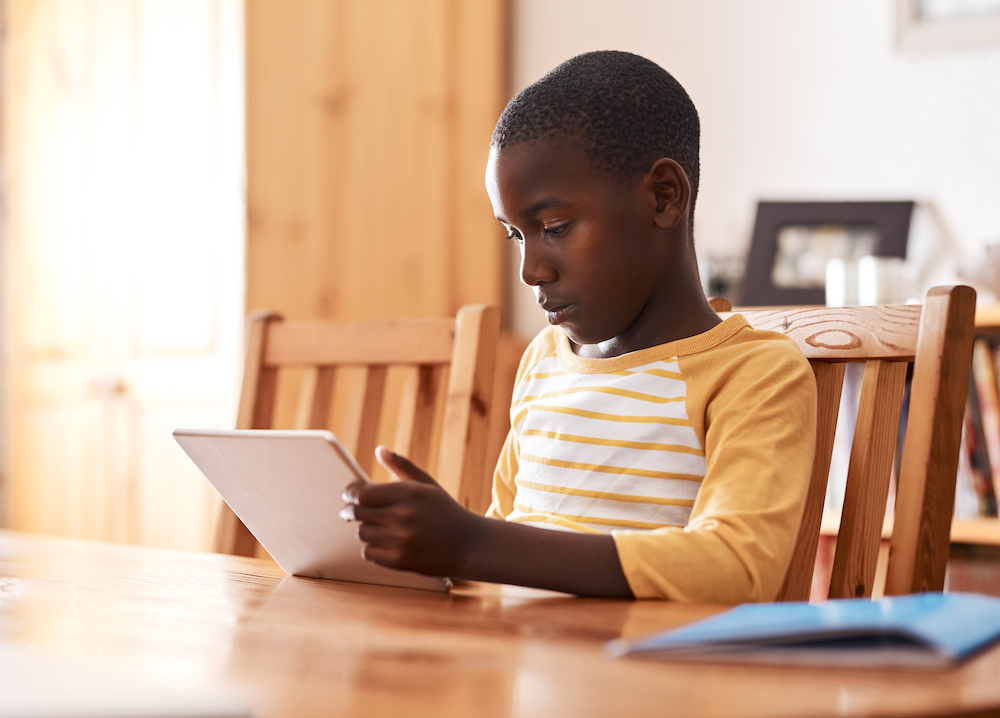Lesson 4: Digital Identity and Online Reputation
Before you start the lesson, make sure to read through the lesson overview and the lesson preparation. The Facilitator Guide can also help you prepare.
Lesson Overview
Learners consider what they value and what is most important to them. Learners develop an understanding for how publicly available online information helps form others’ opinions about them. Learners will also consider what information they want to appear when someone searches for their name.
Lesson Preparation
ESTIMATED TIME
ESSENTIAL QUESTION
- Based on information about you online, how can you shape the ways other people perceive you?
MATERIALS
- Lined Sheet of Paper
- Pen or Pencil
PREPARATION
- Learners will need to be seated in pairs, triads, or small groups for discussion.
- Provide learners with a list of the key vocabulary for this lesson.
- There is an opportunity to localize content to your students’ experience and local context. This opportunity is flagged as a “Teacher’s Note.” We suggest you read through the lesson ahead of time and prepare the example before the lesson begins.
- Optional Activity: Requires computer and internet access for learners.
OPTIONAL: ISTE DIGCITCOMMIT COMPETENCY
- ALERT: I am aware of my online actions and know how to be safe and create safe spaces for others online.
Lesson Hook [10 minutes]
Teacher's Note
Lesson hooks provide facilitators with a baseline for how much learners know prior to engaging in the content of the lesson.
TELL YOUR STUDENTS
When we talk about identity, it is about who you are — your personality, your beliefs and values, your skills, your interests, and hobbies. But remember, we also have an identity online — a digital identity.
Take two minutes to make a list of the top 10 things that represent your identity. Do this individually. You will not have to share these items with the group.
Now with a partner, how many of the items you listed would you be okay sharing with your friends [put an F next to those], a teacher/employer/boss [put a X next to those], a stranger [put an S next to those]?
All of the information you enter, post, and share while you are on the internet helps form your digital identity. If you shared this list of 10 things online, it is important to remember that any of the items that you listed on your identity list could end up online.
Next, we will discuss how publicly available information shapes others’ opinions about you.
Whole Group Discussion [10 minutes]
Learners will consider how publicly available online information helps form others’ opinions about them.
TELL YOUR STUDENTS
In your small groups come up with three things that could form a digital identity and write them down on a lined sheet of paper.
This could include things that you post or share online like news stories, memes, text-based posts, etc. It could also include the information you choose to share about yourself online (e.g., your social media profiles, phone number, etc.).
Teacher's NoteAllow groups five minutes to think through and discuss. Then bring the group back together to discuss as a class.
TELL YOUR STUDENTS
Every time you go on the internet and post something or enter information, you leave a mark.
It’s like when you walk in dirt or mud — you can see your footprint and you are leaving tracks behind you. Sometimes, these tracks cannot be erased.
This means any behavior online leaves a mark depending on how you manage your information.
Next, we will discuss what information you would want to appear when someone searches for your name.
Class Interaction [15 minutes]
Learners will consider what information they want to appear when someone searches for their name.
Teacher's NoteIntroduce students to Angela (a fake persona).
TELL YOUR STUDENTS
Say hi to Angela! Angela just joined the online world. Our goal is to help her on her online journey. Let’s get to know Angela.
Teacher's NoteWrite this information below on the board:
- She is 19 years old, and she is studying to be a nurse.
- She is from Lusaka and she loves karaoke.
- Her family raised her and her brother Jo. They are very close since he is only 2 years younger than her.
- In her free time, she loves to watch movies.
The names and the examples can be further localized to reflect common names and situations in the area you are teaching. The goal of this example is to teach students what makes up a digital identity and discover how basic information about someone's personality can translate into the digital world.
ASK YOUR STUDENTS
Angela also has an identity online — a digital identity. What do you think that might look like? Remember, what she will choose to do online (i.e. share, post) or anything that she will put on the internet — will form her digital identity.
TELL YOUR STUDENTS
In your small group take five minutes to make a list of all the things that Angela might be doing online based on the information you know so far.
Write your responses on a sheet of paper. We will come back together to discuss as a class. Potential Answers:
- Researching Nursing Jobs
- Places (Restaurants) to Sing Karaoke
- Birthday or Holiday Presents for her Brother
- Local Movie Showings or Theater Showtimes
- Movies Trending on Netflix
- Film Festivals
ASK YOUR STUDENTS
- Why is it important to keep your digital identity safe? Imagine that all of the information you have just listed for Angela is stored in a physical file and imagine other people could look at that file.
- Would you make different choices if you knew your movements were not private?
Teacher's NoteProvide time for students to respond.
Class Interaction [15 minutes]
Learners will consider what information they want to appear when someone searches for their name.
TELL YOUR STUDENTS
What should you share about yourself online and what you would keep private? The first step is to identify the people that you usually engage with or can access your information. With your small groups take two minutes and consider the following:
- Would you tell your friends your name?
- Would you tell your friends where you live?
- Would you tell your friends your secrets?
Now, let’s think about other people you see often, and ask yourself the following questions. With your small groups take two minutes and consider the following:
- Would you stand in front of a class or office — where you know some people, but not everyone — and tell them your name?
- Would you tell them your date of birth?
- Would you tell them where you live?
Finally, think about how you personally are using the internet. With your small groups, reflect on what information you share and consider if your posts could hurt others, be misinterpreted, or harm your reputation — or someone else’s.
Teacher's NoteAllow students eight minutes to think through and discuss. Then bring the group back together for a two-minute whole group discussion.
Takeaways [10 minutes]
Recap the lesson with these points.
TELL YOUR STUDENTS
When considering what to share online consider your values and audience, as it may help you more easily determine the information you feel comfortable sharing and what to not share with others.
With new technologies today, publicly available online information can grow very quickly to new audiences and form others’ opinions about you.
Consider what private information you want to appear online when someone searches for your name — especially embarrassing information. Once this type of information is online, it can be very challenging to control who sees this content.
Whenever you share information online (even just directly with one person, like in a text or private message), you should be prepared for the possibility that it may spread well beyond the audience you intended to reach.
Another reason to think about your digital identity is that some of the information you post online can be publicly available through online searches. This could include images, social media accounts, your school, your job and employer, news stories, and your community or social groups.
People you meet could use search engines to obtain more information about you. What they find, good or bad, is going to impact what they think about you. If you want to be able to have control over how they perceive you, it is important for you to know what information they are likely to see.
These people include future employers and school, college, or university admissions officers. Admissions officers may not inform applicants whether or not they looked them up online and/or used the information to make their decision.
Optional Activity
If learners feel comfortable, ask them to search their name in an online search engine or as a class you can decide on a celebrity to search in an online search engine.
ASK YOUR STUDENTS
- What did you find?
- Were you surprised by the information that appeared?
- Do lots of other people have the same name as you?
- What impression might someone who doesn’t know you develop upon seeing these results?
Teacher's Note
Allow 10-15 minutes to discuss as a class.
Congrats!
You've finished the lesson



 Previous Lesson
Previous Lesson 




